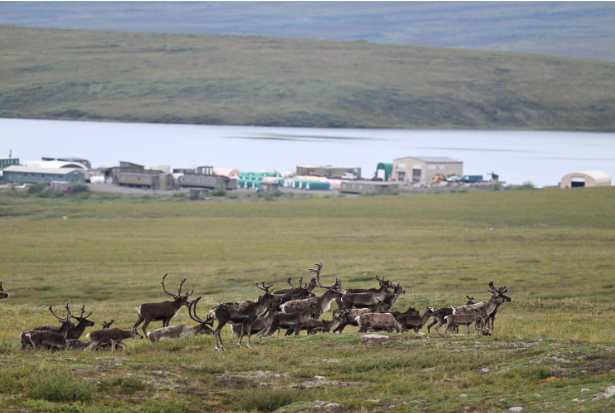FAIRBANKS, Alaska — Six students from the Rural Alaska Honors Institute will be living the life of an arctic field scientist at the Institute of Arctic Biology Toolik Field Station on the North Slope next week as part of a special research course hosted by scientists from the University of Alaska Fairbanks and the National Science Foundation’s Arctic Systems Science thermokarst project.
“We want to expose high schools students to different types of ongoing biology and wildlife research and to inspire them to pursue careers in science,” said Kimberley Maher, a UAF research assistant and a coordinator of the arctic field trip. “RAHI has a great reputation for working with high school students and Toolik Field Station is a perfect venue.”
The students, selected because of their interest in science and willingness to camp for a week without a shower, will have the opportunity to hear, see, feel and smell what it’s like to do research in the field.
“I understand things best when I’m outside, actively learning – not sitting in a chair,” Maher said, who is also an outreach coordinator for the thermokarst project.
The six students, who recently completed RAHI’s six-week program at UAF, are from the Alaska communities of Noatak, Kwethluk, Palmer, Sand Point, and Unalakleet.
With rubber boots and head nets donned and an ample supply of bug dope applied, the students will spend a day exploring tundra landscapes that have collapsed and formed slumps and huge open holes, called thermokarsts, as the result of thawing permafrost. They will learn how scientists determine the age of thermokarsts, how to drill deep soil cores into permafrost, how to identify and describe the plants affected by the slumping soils and what these activities tell scientists about a changing arctic landscape.
Another day will be spent along the Kuparuk River helping scientists collect and sort aquatic insects called macroinvertebrates. They will learn about watershed and witness how the river and the surrounding tundra interact.
The students will meet with an undergraduate student from North Carolina who works as a research assistant at Toolik Field Station and learn about what she does and how she got her arctic science job. They will also attend the weekly science lecture at Toolik Field Station where they can mingle with scientists and students from around the world.
“I am delighted for this special opportunity for RAHI students, after six weeks of learning in the classroom, to now get out into the field and experience real live research,” said Denise Wartes, RAHI program manager.
ADDITIONAL CONTACTS:
Kimberley Maher, UAF research assistant, 907-474-7603, k.maher@alaska.edu.
Denise Wartes, Rural Alaska Honors Institute program manager, 907-474-6866, denise.wartes@alaska.edu.
ADDITIONAL INFORMATION: For photos and contact information of students contact Marie Gilbert, megilbert@alaska.edu.
National Science Foundation, Award #0806394. Collaborative Research: Spatial and Temporal Influences of Thermokarst Failures on Surface Processes in Arctic Landscapes. https://thermokarst.psu.edu/ Breck Bowden, principal investigator, breck.bowden@uvm.edu, 802-656-2513. Recent work has documented that thermokarst failures are abundant and appear to have become more numerous around Toolik Lake on the eastern North Slope and in the western Noatak River basin in Alaska. A widespread and long-term increase in the incidence of thermokarst failures may have important impacts on the structure and function of arctic headwater landscapes. This research will use a systems approach to address hypotheses about how thermokarst failures influence the structure and function of the arctic landscape.
The Rural Alaska Honors Institute, 907-474-5876, https://www.uaf.edu/rahi/. The University of Alaska Fairbank’s Rural Alaska Honors Institute is a six-week, summer, college preparatory bridge program for Alaska Native and rural high school juniors and seniors with a cumulative grade point average of 3.0. Conceived by the University of Alaska and the Alaska Federation of Natives after a series of meetings because of their mutual concern about the retention rate of Alaska Native and rural students, RAHI was one of their solutions to assist them in obtaining higher education.
Institute of Arctic Biology Toolik Field Station. toolik.alaska.edu. 907-474-7412. IAB’s Toolik Field Station, located in the northern foothills of the Brooks Range in northern Alaska on the southeast shore of Toolik Lake, is a world-renowned arctic climate change research station. This location affords access to three major physiographic provinces including the Brooks Range, the Arctic Foothills and the Arctic Coastal Plain. The Station also serves as a base camp for researchers working along the ecological transect from tundra to taiga to boreal forest along the Dalton Highway, from Prudhoe Bay to Fairbanks, Alaska.
This article is courtesy of Institute of Arctic Biology.





